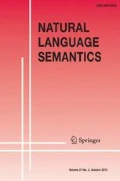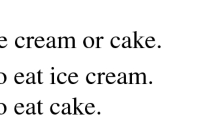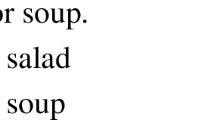Abstract
This paper refutes the widespread view that disjunctions of imperatives invariably grant free choice between the actions named by their disjuncts. Like other disjunctions they can also express a correlation with some factual distinction (fact-dependent reading), but as with modalized declaratives used for non-assertive speech acts this needs to be indicated explicitly. A compositional analysis of one such indicator, depending on, constitutes the point of departure for a uniform analysis of disjunctions across clause types. Disjunctions are analyzed as sets of propositional alternatives that correlate with a partition that the speaker may or may not be able to indicate explicitly. Free choice arises as the specific case where the partition is induced by the preferences of the addressee (understood as necessarily consistent effective preferences/‘goals’).
Similar content being viewed by others
References
Aloni, M. 2004. On choice-offering imperatives. In Proceedings of the 14th Amsterdam Colloquium, ed. P. Dekker and R. van Rooy. Amsterdam: ILLC.
Aloni M. (2007) Free choice, modals and imperatives. Natural Language Semantics 15: 65–94
Aloni, M., and I. Ciardelli. 2013. A logical account of free choice imperatives. In The dynamic, inquisitive, and visionary life of \({\phi }\), ?\({\phi }\), and \({\diamond \phi }\). A festschrift for Jeroen Groenendijk, Martin Stokhof, and Frank Veltman, ed. M. Aloni, M. Franke, and F. Roelofsen, 1–17. Amsterdam: ILLC.
Alonso-Ovalle, L. 2006. Disjunction in alternative semantics. PhD thesis, University of Massachusetts at Amherst.
Alonso-Ovalle L. (2009) Counterfactuals, correlatives, and disjunction. Linguistics and Philosophy 32: 207–244
Anderson, A.R. 1966. The formal analysis of normative systems. In The logic of decision and action, ed. N. Rescher. Pittsburgh: The University of Pittsburgh Press.
Asher N., Bonevac D. (2005) Free choice permission is strong permission. Synthese 145: 303–323
Asher N., Lascarides A. (2003) Logics of conversation. Cambridge University Press, Cambridge
Barker, C. 2012. Imperatives denote actions. In Proceedings of Sinn und Bedeutung 16, ed. A. Aguilar Guevara, A. Chernilovskaya, and R. Nouwen, 57–70. Cambridge, MA: MIT Working Papers in Linguistics.
Barker C. (2010) Free choice permission as resource-sensitive reasoning. Semantics and Pragmatics 3(10): 1–38
Cariani F., Kaufmann M., Kaufmann S. (2013) Deliberative modality under epistemic uncertainty. Linguistics and Philosophy 36(3): 225–259
Charlow, N. 2011. Practical language: Its meaning and use. PhD thesis, University of Michigan.
Charlow N. (2014) Logic and semantics for imperatives. Journal of Philosophical Logic 43: 617–664
Chierchia, G., D. Fox, and B. Spector. 2011. The grammatical view of scalar implicatures and the relationship between semantics and pragmatics. In Semantics: An international handbook of natural language meaning, ed. P. Portner, C. Maienborn, and K. von Heusinger. Berlin: Mouton de Gruyter.
Chierchia G. (2013) Logic in grammar. Oxford University Press, Oxford
Condoravdi, C. 2014. Uncertainty, indifference, and individuation in wh-ever. Manuscript, Stanford University.
Condoravdi C., Lauer S. (2016) Anankastic conditionals are just conditionals. Semantics and Pragmatics (Early Access) 9: 1–62
Copley B. (2009) The semantics of the future (Outstanding dissertations in linguistics). Routledge, New York
Davidson, K. 2013. ‘and’ or ‘or’: General use coordination in ASL. Semantics & Pragmatics 6(4): 1–44.
Fox, D. 2004. Implicature calculation: pragmatics or syntax, or both? Manuscript, MIT.
Frana, I. 2010. Concealed questions. PhD thesis, University of Massachusetts at Amherst.
Frank, A. 1996. Context dependence in modal constructions. PhD thesis, University of Stuttgart.
Geurts B. (1999) Presuppositions and pronouns. Elsevier, Oxford
Geurts B. (2005) Entertaining alternatives: Disjunctions as modals. Natural Language Semantics 13: 383–410
Ginzburg, J. 1995a. Resolving questions, Part I. Linguistics and Philosophy 18: 459–527.
Ginzburg, J. 1995b. Resolving questions, Part II. Linguistics and Philosophy 18: 567–609.
Grice, H.P. 1975. Logic and conversation. In Syntax and semantics, vol. 3, ed. P. Cole and J.L. Morgan, 41–58. New York: Academic Press.
Grimshaw J. (1979) Complement selection and the lexicon. Linguistic Inquiry 10: 279–326
Groenendijk, J., and M. Stokhof. 1984. Studies on the semantics of questions and the pragmatics of answers. PhD thesis, University of Amsterdam.
Grosz, P. 2009. German particles, modality, and the semantics of imperatives. In The Proceedings of NELS 39, ed. S. Lima, K. Mullin, and B. Smith. Amherst, MA: GLSA.
Hamblin C.L. (1973) Questions in Montague English. Foundations of Language 10: 41–53
Hamblin C.L. (1987) Imperatives. Blackwell, New York
Hansen, J., G. Pigozzi, and L. van der Torre. 2007. Ten philosophical problems in deontic logic. In Normative multi-agent systems, Internationales Begegnungs- und Forschungszentrum für Informatik (IBFI), Schloss Dagstuhl, Germany, Dagstuhl, Germany, Dagstuhl Seminar Proceedings no. 7122 ed. G. Boella, L. van der Torre, and H. Verhagen, 1–26. http://drops.dagstuhl.de/opus/volltexte/2007/941.
Hare, R. 1971. Wanting: Some pitfalls. In Practical inferences, ed. R. Hare, 44–58. London: Macmillan.
Heim, I. 1994. Interrogative semantics and Karttunen’s semantics for ’know’. Manuscript, MIT.
Heim, I. 1979. Concealed questions. In Semantics from different points of view, ed. R. Bäuerle, U. Egli, and A. von Stechow, 51–60. Berlin: Springer.
Heim I., Kratzer A. (1998) Semantics in generative grammar. Blackwell, Oxford
Hilpinen, R. 1982. Disjunctive permissions and conditionals with disjunctive antecedents. In Intensional logic: Theory and applications, ed. I. Niiniluoto and E. Saarinen, 175–194. Acta Philosophica Fennica, vol. 35. Helsinki: Academic Bookstore.
Kamp H. (1973) Free choice permission. Proceedings of the Aristotelian Society 74: 57–74
Kamp, H. 1978. Semantics versus pragmatics. In Formal semantics and pragmatics for natural languages, ed. F. Guenthner and S.J. Schmidt, 255–287. Dordrecht: Reidel.
Karttunen L. (1977) Syntax and semantics of questions. Linguistics and Philosophy 1(1): 3–44
Kaufmann S., Schwager M. (2011) A unified analysis of conditional imperatives. Semantics and Linguistic Theory 19: 239–259
Kaufmann S. (2005) Conditional predictions. Linguistics and Philosophy 28: 181–231
Kaufmann M. (2012) Interpreting imperatives. Springer, Berlin
Kaufmann M., Kaufmann S. (2012) Epistemic particles and perfomativity. Semantics and Linguistic Theory 22: 208–225
Klecha, P. 2015. Optional and obligatory modal subordination. In Proceedings of Sinn und Bedeutung 2010, Universität des Saarlandes, ed. I. Reich, 365–379.
Klinedinst N. (2007) Plurals, possibilities, and conjunctive disjunction. UCL Working Papers in Linguistics 19: 261–284
Kolodny N., MacFarlane J. (2010) Ifs and oughts. Journal of Philosophy 197(3): 115–143
Kratzer, A., and J. Shimoyama. 2002. Indeterminate pronouns: The view form Japanese. In Proceedings of the Third Tokyo Conference on Psycholinguistics (TCP 2002), ed. Y. Otsu, 1–25. Tokyo: Hituzi Syobo.
Kratzer A. (1977) What ‘must’ and ‘can’ must and can mean. Linguistics and Philosphy 3(1): 337–355
Kratzer, A. 1991. Modality. In Semantik. Ein internationales Handbuch der zeitgenössischen Forschung, ed. A. von Stechow and D. Wunderlich, 639–650. Berlin: de Gruyter.
Kratzer A. (2012) Modals and conditionals. Oxford University Press, Oxford
Krifka, M. 1995. Focus and the interpretation of generic sentences. In The generic book, ed. G.N. Carlson and J. Francis, 238–264. Chicago: University of Chicago Press.
Lauer, S. 2013. Towards a dynamic pragmatics. PhD thesis, Stanford University.
Lewis D. (1973) Counterfactuals. Blackwell, Oxford
Mastop, R. 2005. What can you do? PhD thesis, ILLC, Amsterdam.
Medeiros, D. 2013. Formal approaches to the syntax and semantics of imperatives. PhD thesis, University of Michigan.
Merin A. (1991) Imperatives: linguistics vs. philosophy. Linguistics 29: 669–702
Merin, A. 1994. Algebra of elementary social acts. In Foundations of speech act theory, ed. S.L. Tsohatzidis, 234–266. London: Routledge.
Ninan, D. 2005. Two puzzles about deontic necessity. In New work on modality, ed. J. Gajewski, V. Hacquard, B. Nickel, and S. Yalcin, 149–178. MIT Working Papers in Linguistics, Cambridge, MA.
Portner, P. 2010. Permission and choice. In Discourse and grammar. From sentence types to lexical categories. In Studies in generative grammar, ed. G. Grewendorf and T.E. Zimmermann, 43-68. Berlin: de Gruyter.
Portner P. (2007) Imperatives and modals. Natural Language Semantics 15: 351–383
Portner P. (2009) Modality. Oxford University Press, Oxford
Ross A. (1944) Imperatives and logic. Philosophy of Science 11: 30–46
Sæbø, K.J. 2002. Necessary conditions in a natural language. In Audiatur Vox Sapientiae. A festschrift for Arnim von Stechow, ed. C. Fery and W. Sternefeld, 427–449. Berlin: Akademieverlag.
Sauerland U. (2004) Scalar implicatures in scalar sentences. Linguistics and Philosophy 27(3): 367–391
Schulz, K. 2003. You may read it now or later: A case study on the paradox of free choice permission. Master’s thesis, University of Amsterdam.
Schwager, M. 2005a. Exhaustive imperatives. In Proceedings of the Fifteenth Amsterdam Colloquium, ed. M. Franke and P. Dekker, 233–238. Amsterdam: ILLC.
Schwager, M. 2005b. Permitting permissions. In Proceedings of the 10th ESSLLI Student Session 2005, Edinburgh, ed. J. Gervain, 306–308.
Schwager, M. 2006. Interpreting imperatives. PhD thesis, University of Frankfurt.
Segerberg K. (1990) Validity and satisfaction in imperative logic. Notre Dame Journal of Formal Logic 31: 203–221
Simons, M. 1998. Issues in the semantics and pragmatics of disjunction. PhD thesis, Cornell University, published by Garland, New York, 2000.
Simons, M. 2005a. Dividing things up: the semantics of or and the modal/or interaction. Natural Language Semantics 13: 271–316.
Simons, M. 2005b. Semantics and pragmatics in the interpretation of or. Semantics and Linguistic Theory 15: 205–222.
Stalnaker, R. 1978. Assertion. In Syntax and Semantics 9, ed. P. Cole, 315–332. New York: Academic Press.
Stalnaker R. (2002) Common ground. Linguistics and Philosophy 25: 701–721
Starr, W. 2011. A preference semantics for imperatives. PhD thesis, Rutgers University.
Thomason, R.H. 1984. Combinations of tense and modality. In Extensions of classical logic (Handbook of philosophical logic, vol. 2), ed. D. Gabbay and F. Guenthner, 135-165. Dordrecht: Reidel.
van Rooy R. (2000) Permission to change. Journal of Semantics 17: 119–145
Veltman, F. 2005. Mixed moods and unmixable modalities. http://www.hmn.bun.kyoto-u.ac.jp/langlogic/symposium-a/handouts/VeltmanHandout.pdf, presented at ’Language under Uncertainty’, Kyoto University, January 2005.
von Fintel K. (1997) Bare plurals, bare conditionals, and only. Journal of Semantics 14: 1–56
von Fintel, K. 2006. Modality and language. In Encyclopedia of philosophy, 2nd ed, ed. D.M. Borchert. Detroit: Macmillan Reference.
von Fintel, K., and S. Iatridou. 2005. What to do if you want to go to Harlem: Anankastic conditionals and related matters. Manuscript, MIT.
von Fintel, K., and S. Iatridou. 2008. How to say ought in foreign. In Time and modality, NLLT 75, ed. J. Guéron and J. Lecarme, 115–141. Berlin: Springer.
Von Wright H. (1968) An essay in deontic logic and the theory of action. North-Holland, Amsterdam
Weatherson, B., and A. Egan (eds.). 2011. Epistemic modality. Oxford: Oxford University Press.
Zimmermann T.E. (2000) Free choice disjunctions and epistemic possibility. Natural Language Semantics 8: 255–290
Author information
Authors and Affiliations
Corresponding author
Rights and permissions
About this article
Cite this article
Kaufmann, M. Free choice is a form of dependence. Nat Lang Semantics 24, 247–290 (2016). https://doi.org/10.1007/s11050-016-9125-4
Published:
Issue Date:
DOI: https://doi.org/10.1007/s11050-016-9125-4




